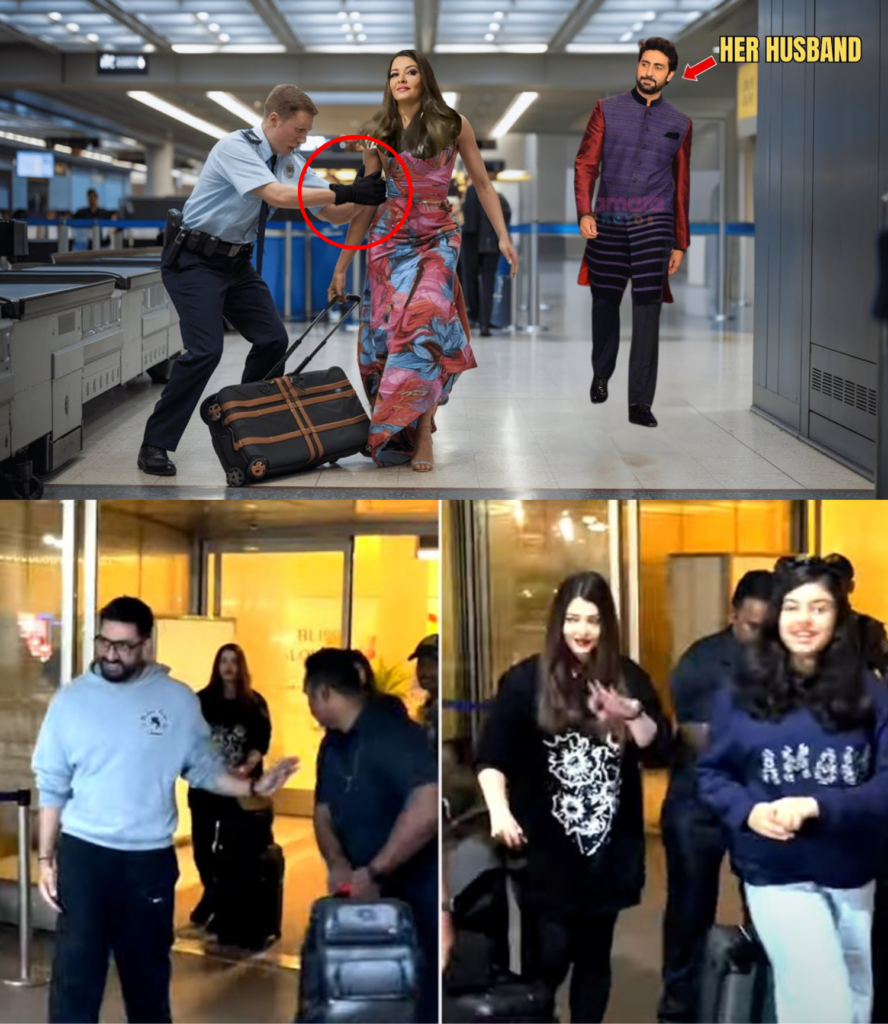It was supposed to be an ordinary day at the airport for Aishwarya Rai Bachchan, one of the most celebrated actresses in Bollywood. She was traveling for a film project, as she often did, but this particular trip would turn into a shocking ordeal that not only affected her but also drew attention to the pervasive issue of unfair treatment.
Aishwarya, known for her grace and poise both on and off the screen, breezed through the airport with the usual ease of someone familiar with the process. She was calm as she approached the TSA security check, prepared for the usual routine of having her bags scanned and her identification verified. Little did she know that a simple trip through security would soon take a turn for the worse.
The TSA officer, a man in his late 30s, appeared to single out Aishwarya as she made her way through the security line. As Aishwarya placed her carry-on luggage on the conveyor belt and stepped through the scanner, the officer raised an eyebrow and gestured for her to step aside.
“Excuse me, ma’am,” the officer said abruptly, his tone colder than necessary. “I’m going to need to inspect your bag.”
Aishwarya, accustomed to the process, complied without a word. However, the officer’s treatment of her seemed far more invasive than the routine checks others were receiving. As the officer unzipped her luggage and began to toss aside her belongings without any clear explanation, Aishwarya felt a sharp pang of frustration. There was no reason for such treatment, and certainly no respect for her privacy or personal belongings. Her makeup kits, clothes, and valuables were roughly handled.
The Destruction of Her Luggage
What followed was even more shocking. As the officer continued rummaging through her belongings, Aishwarya politely asked, “Is there a problem, sir? I’ve already passed through security and there’s nothing unusual in my bag.”
But the officer ignored her questions, continuing to carelessly damage her items. Some of her cosmetics were crushed, and her dresses were wrinkled beyond repair. The officer made no attempt to be gentle, and Aishwarya was horrified to watch her personal possessions being destroyed with such disregard. The scene attracted the attention of other passengers, who began to whisper among themselves as they witnessed the unnecessary humiliation.
“Why are you treating my things like this?” Aishwarya asked, trying to maintain her composure.
The officer simply shrugged, showing no remorse. “Just routine inspection,” he replied dismissively, ignoring the obvious distress he was causing.

A Shocking Realization
It was at this moment that a manager approached the scene, having been alerted by other passengers who were disturbed by the way Aishwarya was being treated. The manager quickly recognized Aishwarya, but the TSA officer, still oblivious, continued his routine actions. When the manager stepped in to address the situation, Aishwarya was visibly upset.
“Ma’am, I’m so sorry for the inconvenience,” the manager said, but his words did little to ease the tension. “This is not acceptable behavior, and we will investigate.”
As the TSA officer continued to act without any accountability, it became clear that Aishwarya’s race and status as a celebrity were playing a role in the way she was being treated. Her treatment wasn’t just an error of procedure—it was a reflection of a system that often discriminates and targets individuals based on assumptions.
Speaking Up for Justice
Aishwarya, who had kept her composure throughout the incident, decided it was time to take action. As the manager apologized and began to take notes, Aishwarya spoke firmly. “This is not just about the destruction of my belongings,” she said. “This is about the disrespect, the assumption that I don’t matter as much as others in this line. This is about the way women, especially women of color, are treated unfairly in public spaces.”
Her words were powerful, and others who had been watching the situation unfold began to voice their support. Some passengers applauded her bravery for speaking up, and others joined in to ask for a change in how such situations were handled. Aishwarya’s stance became a moment of solidarity for everyone who had ever felt marginalized or unfairly targeted by systems meant to serve them.
A Call for Accountability and Change
As Aishwarya spoke to the airport staff, it became clear that this moment would not go unaddressed. The manager promised that a full investigation would take place into the officer’s conduct. But for Aishwarya, this moment was bigger than just an apology. It was about a call for change. She knew that her platform could amplify the issue and bring attention to the broader problem of racial and gender bias within systems like airport security.
“I’m not just here to ask for compensation,” she said. “I’m asking for an acknowledgment of the problem. It’s time we address how people like me—people who might look different, people who don’t conform to stereotypes—are treated in these spaces. We deserve respect and fairness, just like anyone else.”
Her words were a powerful call for systemic change, and her actions sparked a broader conversation about the ways in which public institutions often fail to address deep-rooted biases and injustices. It was a moment of clarity—a turning point where Aishwarya, standing as a figure of dignity and strength, inspired others to examine their assumptions and confront inequality.
The Aftermath
In the days that followed, Aishwarya’s story made headlines, bringing attention not only to the issue she faced at the airport but also to the broader conversation about racial and gender discrimination. Many praised her for her composure and courage in the face of unfair treatment. Some of her fans, too, shared their own stories of similar experiences, expressing gratitude for Aishwarya’s willingness to stand up and speak out.
The airport eventually issued a public apology, acknowledging the mishandling of the situation and promising reforms in their security procedures to prevent such incidents from happening in the future. The TSA officer involved in the incident faced disciplinary action, and the entire incident led to a broader reevaluation of how individuals are treated during security checks.
A Powerful Legacy of Accountability
Aishwarya Rai Bachchan’s response to this ordeal wasn’t just about addressing one officer’s mistake—it became a pivotal moment for raising awareness about the unfair treatment that many people face, often in silence. Her actions brought attention to the need for more inclusive and fair practices in airports and other public spaces, ensuring that everyone, regardless of race or gender, is treated with the dignity they deserve.
This powerful true story is a reminder of the importance of speaking up when injustice occurs, of using one’s voice to challenge assumptions, and of the power of accountability in creating systemic change. What started as an unfair and painful experience for Aishwarya ended up becoming a catalyst for a much-needed conversation about respect, fairness, and equality.
In the end, Aishwarya’s moment of adversity became a moment of empowerment for many, highlighting the strength it takes to confront injustice and the hope that change is always possible when people come together to demand it.
News
Sara Ali Khan and Amrita Singh at Saif Ali Khan and Kareena’s House! Prasad Given for Saif’s Health
Sara Ali Khan and Amrita Singh at Saif Ali Khan and Kareena Kapoor Khan’s House! Prasad Given for Saif’s Health Introduction Bollywood families often make headlines for their glamorous public appearances and professional achievements, but sometimes, the heartwarming and…
Ameesha Patel Reacts to Fans Demand to Marry Salman Khan for Having Good Looking Kids
Ameesha Patel Reacts to Fans’ Demand to Marry Salman Khan for Having Good-Looking Kids In the world of Bollywood, celebrity marriages and relationships often capture the imagination of fans and the media. Over the years, various pairings of stars…
Taimur Ali Khan hitting papa Saif Ali khan ! Saif Kareena kapoor spotted outside their home finally
Taimur Ali Khan Playfully Hitting Papa Saif Ali Khan! Saif and Kareena Kapoor Spotted Outside Their Home Finally Introduction In the world of Bollywood, the personal lives of celebrities often take center stage. Among the most beloved families in…
Sara Ali Khan Amrita singh with Saif Ali khan at home ! Kareena warm welcome for Amrita singh
Sara Ali Khan, Amrita Singh with Saif Ali Khan at Home! Kareena’s Warm Welcome for Amrita Singh Introduction The world of Bollywood has always been filled with glamour, fame, and the complexities of relationships. However, beyond the spotlight, many…
Tears in Rashmika Mandanna Eyes Reveals the Heart of Her Character Maharani Yesubai in Chhaava Movie
Tears in Rashmika Mandanna’s Eyes Reveal the Heart of Her Character Maharani Yesubai in Chhaava Movie Rashmika Mandanna, one of the most celebrated actresses in Indian cinema, has once again captivated the audience with her powerful performance in the…
Rashmika Mandanna Vijay Devarakonda Going to Celebration of New Year after Dating Rumored
Rashmika Mandanna and Vijay Deverakonda Going to Celebration of New Year After Dating Rumors The excitement surrounding the rumored relationship between two of Tollywood’s most beloved stars, Rashmika Mandanna and Vijay Deverakonda, has been growing steadily, and it reached…
End of content
No more pages to load






